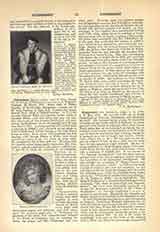

Fitzherbert, SIR ANTHONY, judge, b. in 1470; d. May 27, 1538. He was the sixth son of Ralph Fitzherbert of Norbury, Derbyshire, and Elizabeth Marshall. His brothers dying young, he succeeded his father as lord of the manor of Norbury, an estate granted to the family in 1125 and still in their hands. Wood states that he was educated at Oxford, but no evidence of this exists; nor is it known at which of the inns of court he received his legal training, though he is included in a list of Gray’s Inn readers (Douthwaite, Gray’s Inn, p. 46.) He was called to the degree of serjeant-at-law, November 18, 1510, and six years later he was appointed king’s serjeant. He had already published (in 1514) his great digest of the year-books which was the first systematic attempt to provide a summary of English law. It was known as “La Graunde Abridgement” and has often been reprinted, both entire and in epitomes, besides forming the foundation of all subsequent abridgments. He also brought out an edition of “Magna Charta cum diversis aliis statutis” (1519). In 1522 he was made a judge of common pleas and was knighted; but his new honors did not check his literary activity and in the following year (1523) he published three works: one on law, “Diversite de courtz et leur jurisdictions” (tr. by Hughes in 1646); one on agriculture, “The Boke of Husbandrie”; `and one of law and agriculture combined, “The Boke of Surveyinge and Improvements”. All three were frequently reprinted and though Sir Anthony’s authorship of the “Boke of Husbandrie” was formerly questioned it is now regarded as established. Meanwhile his integrity and ability caused much business to be entrusted to him.
In 1524 Fitzherbert was sent on a royal commission to Ireland; Archbishop Warham appointed him by will sole arbitrator in the administration of his estate; and in 1529 when Wolsey fell, he was made a commissioner to hear chancery causes in place of the chancellor, and he subsequently signed the articles of impeachment against him. As one of the judges he unwillingly took part in the trials of the martyrs Fisher, More, and Haile, but he strongly disapproved of the king’s ecclesiastical polity, particularly the suppression of the monasteries and he bound his children under oath never to accept or purchase any abbey lands. In 1534 he brought out “that exact work, exquisitely penned” (Coke, Reports X, Pref.), “La Novelle Natura Brevium”, which remained one of the classical English law books until the end of the eighteenth century. His last works were the constantly reprinted “L’Office et Auctoryte des justices de peas” (1538), the first complete treatise on the subject, and “L’Offiee de Viconts Bailiffes, Escheators, Constables, Coroners”. Sir Anthony was twice married, first to Dorothy Willoughby who died without issue, and secondly to Matilda Cotton by whom he had a large family. His descendants have always kept the Faith and still own his estate of Norbury as well as the family seat at Swynnerton.
EDWIN BURTON

